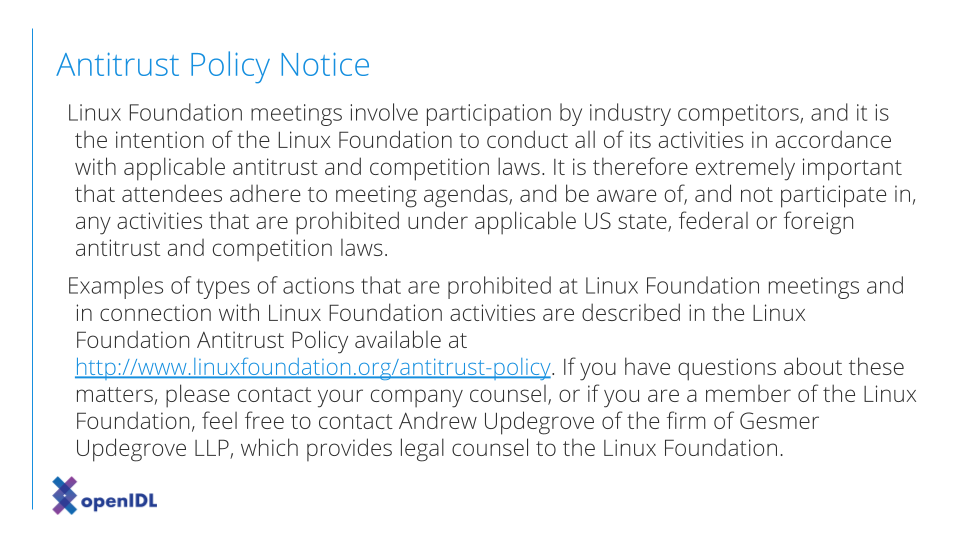openIDL Navigation
Date
ZOOM Meeting Information:
Monday, March 27, 2023, at 11:30am PT/2:30pm ET.
Join Zoom Meeting
Meeting ID: 790 499 9331
Attendees:
- Sean W. Bohan (openIDL)
- Allen Thompson (Hanover)
- Mason Wagoner (AAIS)
- Peter Antley (AAIS)
- Justin Cimino (AAIS)
- Brian Mills (AAIS)
- Jeff Braswell (openIDL)
- David Reale (Travelers)
- Joseph Nibert ( AAIS)
- Ken Sayers (AAIS)
- Yanko Zhelyazkov (Senofi)
- James Madison (Hartford)
- Brian Hoffman (Travelers)
- Dale Harris (Travelers)
- Satish Kasala (Hartford)
- Tsvetan Georgiev (Senofi)
- Aashish Shrestha (Chainyard)
- Faheem Zakaria (Hanover)
Agenda:
- JamesM Discussion: coding & operating standards: queries, null, etc.
- Update on ND POC (KenS)
- Update on openIDL Testnet (Jeff Braswell)
- Update on internal Stat Reporting with openIDL (Peter Antley)
- Update on Infrastructure Working Group (Sean Bohan)
- MS Hurricane Zeta POC Architecture Discussion (KenS)
- Architecture Decision Capture Process (KenS) - Discussion
- AOB:
- Future Topics:
Notes:
- PA
- ingestion format conditional
- https://github.com/openidl-org/openidl-main/tree/awg/openidl-statplans/pa
- AWG branch, stat plan as a PDF
- stat plan, going forward tyalking about reg reporting, stat stuff might be a buzzword
- recycling auto stat plan, openIDL reg reporting standard for personal auto
- personal and commercial auto but for this personal
- big ?: decoding and how we go about it
- link 1 - stat plan PDF
- stat record broken out by column
- join on all codes and ref tables
- personal auto stat view - not claim or prem specific yet
- SDMA and GT2 - stor all in one table
- Source of truth is stat plan instead of sql
- James A
- modeling group
- 5-6 questions, arch in nature
- 1. lookup tables in code, as opposed to more maintainable
- location of record for these codes, in the JSON and those are the official locations of codes and values
- comfortable with json as place to maintain it
- KS
- interaction points of business people?
- JM
- maintain lookup tables in excel, can send to anyone and they can navigate - intermediate tech and business
- helps
- in json and modify
- lookup tables change at same freq as code
- able to release independently
- BA/QA type roles - maintaining it
- PA
- utilizing flyway to manage db
- JN
- biggest concern is lookup tables - for insert of data only
- if we know version 001, ABS table will only have 3 records, if we want to add more things, vers 00.2 -would know by looking at schema history - truth kept on DB and not on some obscure file
- KS
- two things - schema and data
- for ref tables, data is much less changeable, doesnt change as often, more often than schema
- wouldn't use flyway for transactional data (states, lookups, never transax)
- is Flyway meant to be applied to data as much as schemas? more schema management than data migration
- lost with schema vs data
- new code for personal auto? needs to go to every carrier
- new code? does change data
- JN
- define as a team how we handle it - dont care in DBMS versioning? then pull it out - depends on how strict
- KS
- when do customers participarte in management of lookup data
- JM
- some ways, ref data behaves like code
- rows part of schema seems reasonable
- programmer go into json to modify it?
- PA
- depends on budget
- could make excel and easily pull json out of excel
- need to gen sql file
- KS
- process involved - cost in distribution, governance, approvals, acceptance of changes not changes themselves
- if a programmer vs someone loading an excel = trivial process cost
- PA
- how much harder to use excel vs configs? API to access it?
- JM
- if driivng off json files less worried
- reduce programmer jobs due to expense
- PA
- coverages, based on codes, categories
- some get weird, multistate for 47 states, code gets
- JM
- still need to be able to read json
- versioning is intriguing
- code that does inserts
- released with everything else
- how would flyway treat lookup tables and schema-ized notions
- run into issues - modify to, make script with updates
- JN
- how we decide to do versioning, all we have to do in the script
- as a team discuss as well
- peak constraints,
- fly way is controlled version of schema, and do checks for alter/doesnt - keeps us honest
- JM
- as long as it is re-runnable
- JB
- 3 things:
- data standard
- implementation at phys level
- verisoning and deployment of changes
- standards often used in forms easier to manage by biz side
- renumerations, typically used at that level
- what will happen with sql / json
- implementation
- cutting out top level, def of data format and enumwerations
- standard orgs like ISO, LEI others - will combine things into single code table for type being used for
- becomes implemented and turned into phys usage
- relevant to consider defs of code tables as reference for data docs and see how easy to automate/deploy/version
- 3 things:
- KS
- vers of the schema and the data dictionary and lookup table values
- understand
- standardization things like accord - top level doc
- standard
- vers of standard
- fancy terms and structure to make it very official
- JSON nice intermediate form
- JB
- labels, structure, readable
- normative
- "shall conform"
- ocumenting lookup tables seems like more work but having a form you can extraxt from is good
- schema is a phys thing, implementation of a particular db
- important to get buy in form the biz side, look at it, anyone can use, look at higher level docs
- PA
- on Fri going forward, openIDL personal auto data standard as a doc
- version, automate, check it
- JB
- good for consistency and reliabllity
- do want some form that someone who doesn't und the lower level can und the standard
- JM
- right b/w JSON and statplan - gap there
- once you get the json, somewhat readable
- JB
- prob with XML standards, rigid, JSON has flexibility, sequence not as important
- there are benefits to good clear semantic defs
- not so much stat plan as it is the doc of the business side
- starts conceptual
- KS
- documentation of the standard
- need the same thing for HDS which is NOT the stat plan
- eventual data standard
- JB
- excel example is readable
- JM
- spreadsheets are readable and consumable
- attempt to be in the middle
- not sure right for this job but worth looking at
- JB
- lead in to this (PEter's work)
- KS
- going back to way it works, PA and JN, techs will not say "we need to add new code to this table" - will do it based on an org managing a standard saying "we need a new code", managed at standard level not code level
- maybe excel as working docs
- PA - hard time imagining an excel could help him out
- actual values would fit in excel but also a whole para explaining
- KS -
- excel is a comms mechanism so those like DH and others can contribute to the standard
- JM
- data dictionary of sorts
- when it needs ot change, how will you do that
- ex: ref w/ 3 rows, add 4th and 5th
- know before x used code c and after code d
- PA
- decode with left joins
- stick expiration dates on "where clause"
- KS
- must bubble up to EPs and Reports
- run report on data 2 years old, or last year, super complicated extraction
- morphing of the algo
- data avail or not
- JB
- effect other things
- KS
- changing schema gets nasty
- JB
- no need to change schema if updating code tables
- JM
- if we need expiration dates on ref tables, as the years go by, put in effect and expire var rows
- JB - just because useful doesn't mean you have to implement
- PA
- can I add Jan 1 2000
- JM
- need to standarize on neg and pos affinity
- KS
- where does the data come from? one time extraction, another view for this year
- JM
- comes from biz people
- DH - 15 years ago we didn't have electric cars, now we want them as a vehicle type
- KS
- do a report on what came through, cant ask for code on a report if it didn't exist
- need to be respectful of changes to data
- sensitivity to the date
- PA
- doing decode based on date of when policy was issued
- KS
- view has to understand the decode based on the date
- JB
- if a code didn't exist in a hist record, b/c newer code, make exception anyway
- JM
- effective expiration on all lookup tables
- append case is easy case
- when a given code needs diff meaning in the future than whan it was in the past
- PA
- now not limited to 0-9, code 11 would need to move to the end
- JB
- "the code is B"
- JM
- global arch assumption, fixed width problems are over, everything is meaningful
- codes are unique, no prob of duplicity
- no effective expiration dates
- DH
- add a code later on, make sure not being used in the past
- no vehicles in 1950s showing electric cars
- KS - validation rule?
- JM
- entry in ref table issued will never change? bold statement
- JB - include context of code was for
- important - codes differentiate properties specify terms of policies and the business, actual models of the business itself
- JM
- compromises too
- KS - not mutually exclusive
- JM - over-engineered
- KS - posited, using a rule to check if a code should be that, effectively an expiry date on a row, generalized for every field, dont need to write individual rules
- use effective expiration dates
- assumes not having value there, handled elsewhere
- JB - could have codes for entities or things that expire, expiration important
- JM
- immutability argument, once a code never rescind it
- PA
- more granular columns would make sense
- KS -could do by expiring all codes in those fields
- cant expire schema
- json key optional
- more flexible for the future
- processing of the historical records
- PA - expiration on every code? yes
- default values based on stat plan?
- JB - advocate 1/1/2000, hard limit some can't go past 2186?
- need a hard future data vs needing it null
- tech limit on dates?
- KS
- new item - default start and end dates
- reco start date that gave KS a scare - 2k
- bad idea - will we get data before 2k we need to work with? If so go 1970 or 1900
| Time | Item | Who | Notes |
|---|---|---|---|
Documentation:
Notes: (Notes taken live in Requirements document)
Recording:
Overview
Content Tools

